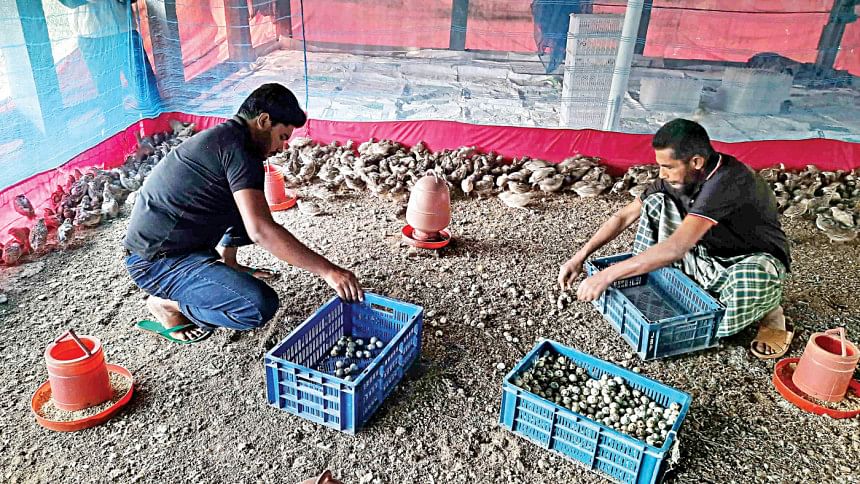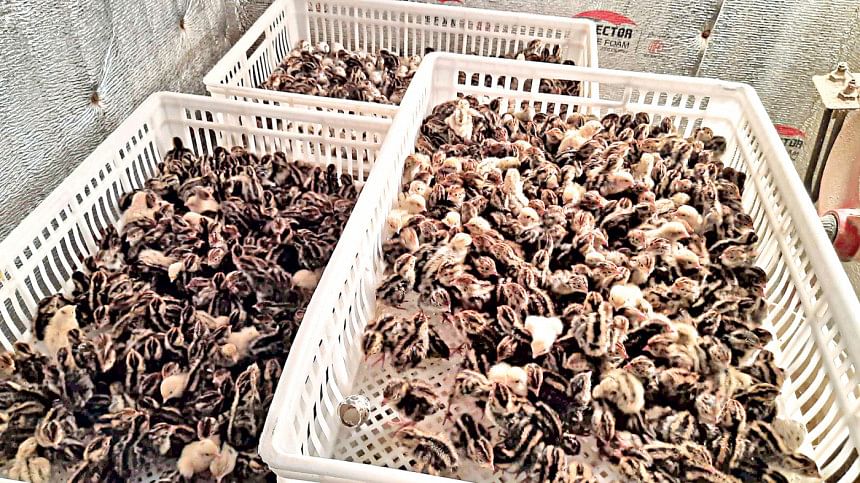Quail farming catching on in Bagerhat

Mehedi Hasan, a university student who lives in Kashempur village of Bagerhat sadar upazila, lost his chicken farm over a year ago as coronavirus-induced losses made it impossible for him to continue operations.
However, he eventually started hatching quail eggs in an incubator at home in a bid to try his hand at a new venture.
Although Hasan was able to hatch just 79 chicks from 370 eggs in his first attempt back in December 2020, there are now 20,000 quails at his farm, which earns him between Tk 40,000 and Tk 45,000 per month.
After seeing Hasan's success first-hand, many others in the area are now interested in quail farming.
Sources at the Department of Livestock Services say they are working to create new markets for quail meat and eggs so that more young entrepreneurs are encouraged to raise the bird on a commercial basis.
Mohammad Sumon, a resident in Fatepur village, went to see Hasan's farm after hearing about it from various people. Later, he bought some chicks from him and started raising quail as well. At present, he has about 3,000 birds on his farm.
"This farming has brought prosperity to my life," he said.

Currently, there are around 40 farms in Bagerhat that house more than 80,000 quails and the number is gradually increasing, according to the District Livestock Office.
Hasan sells between 4,000 and 4,500 eggs and 4,200 to 4,500 quails each week. Eggs are priced at about Tk 2 apiece while the wholesale rate for quails is between Tk 20 and Tk 30.
Hasan's father, Sheikh Sarwar, once worked for a private company in Dhaka, but after seeing his son's success, he has returned home to help tend the farm and no longer needs outside employment.
Similarly, his sister Maria Khatun helps out alongside her studies by working the incubator and separating chicks between those that will lay eggs and those that will be raised for consumption as meat after slaughtering them.
Hasan says he had a farm of about 1,200 chickens but due to death and disease amid falling prices, he faced debt to the tune of Tk 7 lakh.
"I then turned to quail farming and now I have gotten rid of almost all my debts," he added.
According to the entrepreneur, it takes about 16 days for an egg to hatch in an incubator. Quails raised for meat can be sold within 28 days of birth while they start laying eggs after 45 to 50 days.
"If the price of quail eggs and meat increases a little, we will be able to make better profits," Hasan said, adding that the biggest advantage of rearing quail is that it does not require any special medicines to prevent disease.
Quail meat and eggs are becoming more popular day by day thanks to their rich quality, according to Bagerhat District Livestock Officer Lutfar Rahman.
"Eating eggs of this bird is especially beneficial for diabetic patients with high blood pressure. But the local quail market is not yet well-established, so we are working to increase market access for those who are currently engaged in rearing them."
He says quail eggs can be a very good source of energy and are rich in protein and iron.
If more young people like Hasan take the lead in rearing quail, they will be able to play a role in meeting the country's demand in this regard and becoming self-reliant, he added.
Quail birds are farmed across the country since its eggs and meat are increasingly getting popular.
Naima Sultana, a homemaker in the capital's Dhaka, buys quail eggs regularly. Her three-member family consumes six eggs a day and the price is Tk 12 per four pieces.
"My one and a half-year-old son does not like to eat chicken eggs, but he likes to eat quail eggs," she said.
Khaled Hossain, who lives in the capital's New Eskaton area, buys quail eggs for his six-year-old son from a super-shop located in the neighbourhood.

 For all latest news, follow The Daily Star's Google News channel.
For all latest news, follow The Daily Star's Google News channel. 



Comments